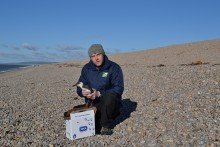A major victory has been won in the battle to ensure adequate protection for our marine environment as the International Maritime Organisation (IMO) announce they have decided to reclassify Polyisobutelene (PIB), making it illegal to discharge any amount into the sea.
Earlier this year, we were devastated to see the sight of over 4,000 dead or dying seabirds washed ashore on Dorset’s beaches after two separate spills or deliberate releases of the chemical PIB into the sea. Working from the Fine Foundation Chesil Beach Centre at Portland, Dorset Wildlife Trust conservation officers rescued many hundreds of birds and transferred them for cleaning by the RSPCA.
Quick action from conservation groups including The Wildlife Trusts (including Dorset Wildlife Trust), RSPB, and the RSPCA led a concerted campaign backed by thousands of public signatures and letters to MPs to ask the IMO to reclassify PIB as a ‘noxious liquid substance’.
The substance, which has been likened to PVA glue in consistency, coats the feathers of birds such as guillemots, razorbills and gannets, rendering them unable to fly or maintain core body temperature. Beaches in the South West of England were a sorry sight, as birds came ashore with every high tide.
Dorset Wildlife Trust Chief Executive and marine biologist, Dr Simon Cripps, said, “Today’s decision is a real step forward to ensure the safeguarding of our seas and sea-life for future generations. This success shows what can be done by organisations working in partnership to orchestrate public opinion. It is not acceptable that shipping uses our seas as a dumping ground for such dangerous wastes. I commend the International Maritime Organisation for their prompt action in response to our urgent request for reclassification of this dangerous chemical.”
For more information about thepolyisobutene (PIB) pollution in the English Channel, please visit
https://www.dorsetwildlifetrust.org.uk/marine_pollution_incident.







